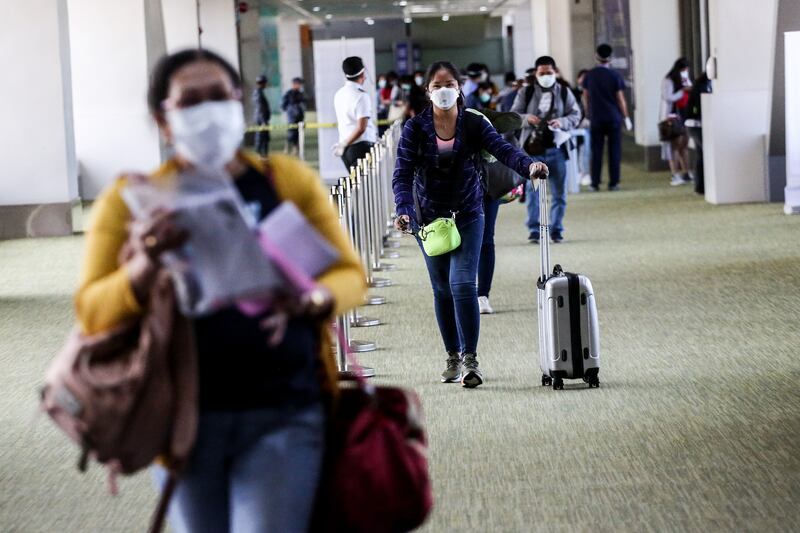Updated at 1:49 p.m. ET on 2021-02-05
Philippine drug regulators on Thursday cleared a U.S. and German-made COVID-19 vaccine for emergency use, the first such approval in a country among the worst hit by the virus in East Asia.
The Pfizer-BioNTech vaccine, developed by American pharmaceutical giant Pfizer and the German firm BioNTech, is 95 percent effective against the coronavirus disease, the head of the Philippine Food and Drug Administration said, citing interim data from Phase 3 trials.
“After a thorough review of the currently available data by medical and regulatory experts, the FDA is granting Emergency Use Authorization to Pfizer-BioNTech COVID-19 vaccine,” Rolando Enrique Domingo, the agency’s director general, announced in a statement.
“The benefit of using vaccines outweighs the known and potential risks,” Domingo said, noting that scientists so far had no “specific safety concerns” about the drug made by Pfizer and BioNTech, which had applied to the Philippine FDA three weeks ago for the emergency-use authorization (EAU).
Domingo did not say when mass inoculations in the Philippines would start, how many doses of vaccine would be delivered, or when.
In the Philippines, nearly half a million people have been infected with the coronavirus disease and almost 10,000 have died of it since the pandemic began here in early 2020. The country has the second highest number of cases and deaths from COVID-19 in East Asia, next to neighboring Indonesia, according to data from Johns Hopkins University in the United States.
The approval for the Pfizer-BioNTech drug came a day after Philippine health authorities confirmed that a highly contagious variant of the virus – first traced to the United Kingdom and known as B.1.1.7 – had been detected in a Filipino traveler who arrived here last week on a flight from the United Arab Emirates.
As for the safety of the vaccine, Domingo said the government would “closely monitor” any adverse reaction to it.
“The roll out of the vaccine and use in more than 5 million people worldwide has identified severe allergic reaction in a few individuals. Therefore, the vaccinations must be done by health professionals trained to recognize and manage adverse reactions, and they should have resources at hand to adequately respond,” Domingo said.
Separately, his agency has received EAU applications for vaccines developed by British-Swedish firm AstraZeneca and Russia’s Gamaleya Research Institute of Epidemiology and Microbiology. The Chinese state-owned drug firm Sinovac Biotech had not yet completed its application for an emergency-use authorization for its vaccine, Domingo said.

Earlier this week, Harry Roque, the spokesman for President Rodrigo Duterte, said the government had secured a deal to buy 25 million doses of vaccines from Sinovac and that these would be arriving in batches, beginning in February.
Last month, President Rodrigo Duterte revealed that soldiers in the country had been inoculated against the coronavirus with shots of a vaccine developed by Sinopharm, another Chinese firm, although the FDA had not approved it for use.
After news broke that members of Duterte’s body guard – which is made up of military personnel – had received doses of the Chinese vaccine, FDA head Domingo urged the public not to use vaccines supplied through the black market.
The Senate, which is dominated by Duterte allies, had threatened to investigate the revelation but it dropped this plan after Duterte warned them against doing so, saying this could cause friction between his administration and the legislature. The Senate then dropped the plan.
Duterte this week also defended the reputation of Chinese-made vaccines, although news reports said that authorities in Brazil had downgraded the effectiveness of Sinovac’s COVID-19 vaccine to only 50.4 percent.
They are “as good as any other vaccines invented by the Americans or the Europeans,” the Philippine president said in a taped message, which aired late Wednesday.
“The Chinese do not lack brains. The Chinese are bright,” Duterte said. “And they would not venture if it’s not sufficient – if it’s not safe, sure, and secure.”
Jeoffrey Maitem contributed to this report from Cotabato City, Philippines.
CORRECTION: An earlier version failed to note that the Pfizer-BioNTech vaccine was developed by U.S. firm Pfizer and BioNTech, a German firm.
